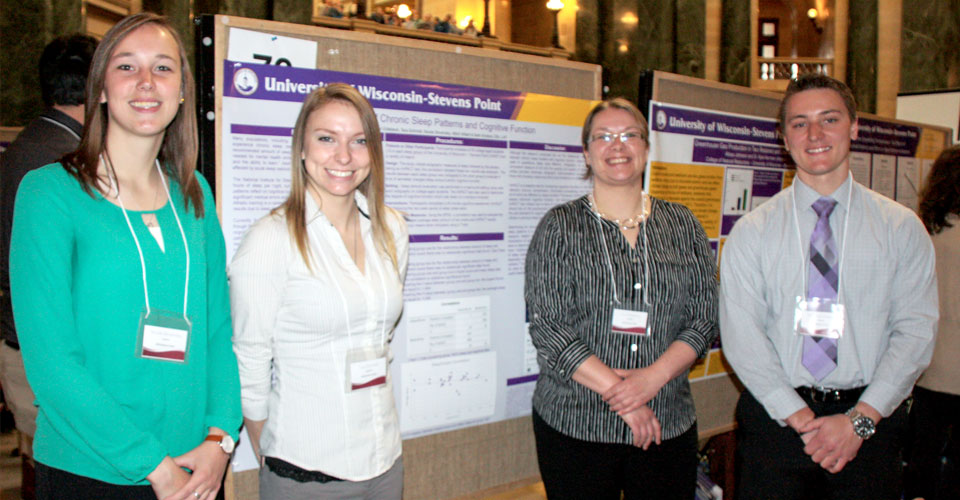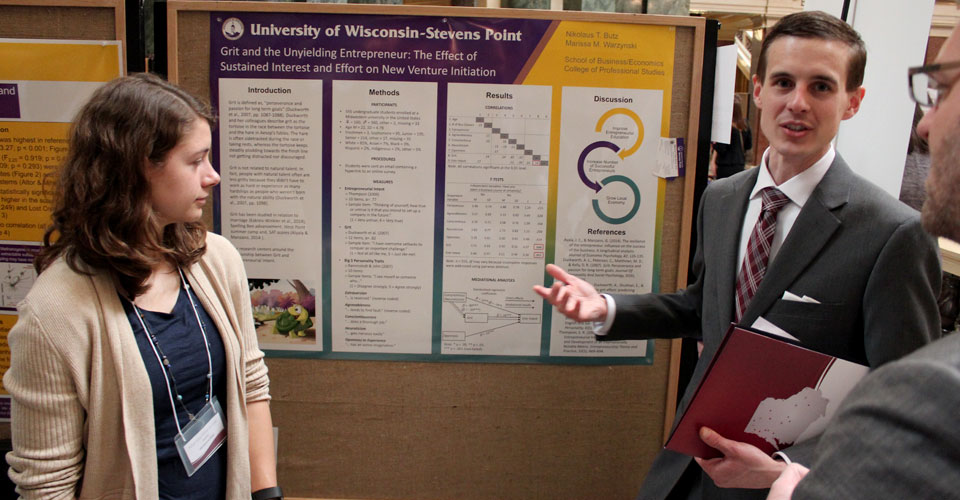
Two exhibits of undergraduate research from the University of Wisconsin-Stevens Point College of Professional Studies were on display at the 14th annual Research in the Rotunda event Wednesday, April 12, at the State Capitol in Madison.

UW-Stevens Point athletic training undergraduates Nicole Slovensky, Tara Schmidt, Teri Edlebeck and Mitchell Willert presented their research on “Does Chronic Sleep Restriction Relate to Cognitive Function? An Examination of Chronic Sleep and Its Relationship with Cognitive Function in College Students” under the guidance of Associate Lecturer Beth Kinslow.
The National Institute for Sleep has agreed on standards regarding the optimal hours of sleep per night, but how does this reflect over time on cognitive function. Many populations, including college students, experience chronic sleep restriction defined as experiencing less than the recommended amount of sleep for 7+ days. Studies on chronic sleep restriction are historically completed with self-report sleep studies, the increase use of fitness tracking devices (actigraphy) that record sleep patterns allows new way to monitor sleep patterns over time. Exploring the relationship between chronic sleep patterns and cognitive function, will highlight the importance of chronic sleep habits. Objective: The purpose of our study was to examine the effect of cognitive function of college students after chronic sleep evaluation. Specifically, the result of cognitive assessments done through ImPACT after a two-week period of sleep tracking via actigraphy. The relationship between amount of sleep and cognitive function was assessed in addition to comparing two sleep groups at different times in the semester. Design: The study utilized a correlational study to evaluate the relationship between these two results. Setting: Sleep evaluation was monitored in a real-world setting using wrist worn actigraphy on college-aged students. The ImPACT test was used to determine the degree of cognitive function. Patients or Other Participants: Participants consisted of 30 college-aged students (15 in each sleep group) of the University of Wisconsin-Stevens Point (UWSP) from a variety of majors. Interventions: Participants completed a 40-minute cognitive assessment (ImPACT test) following the two-week period of recording sleep patterns via actigraphy. Outcomes: Using the SPSS, a correlation was used to evaluate the relationship between average sleep amount of two weeks and ImPACT results. Additionally, group means were compared using a T-test. Results: The results indicated no significant correlation between amount of sleep and ImPACT score (r= -.363, p=.068) Additionally, there was no significant difference between groups in either ImPACT score (t= -1.064, p=.456) or average amount of sleep (t= -1.036, p=.067). Conclusion: Although the research conducted did not find statistically significant data between sleep and cognitive function, the need to examine the effects on chronic sleep deprivation and cognitive function needs further research. ImPACT testing is utilized in the clinical setting for baseline and post-concussion assessment, rather than being utilized for cognitive testing due to chronic sleep deprivation. Future research studies should identify other factors that could affect chronic sleep deprivation. In addition, future researchers should identify assessment methods better aimed at assessing cognitive function.

School of Business and Economics student Marissa Warzynski presented “Grit and the Unyielding Entrepreneur: The Effect of Sustained Interest and Effort on New Venture Initiation” with the support of Prof. Nik Butz.
The purpose of this study was to explore the relationship between grit and entrepreneurial intentions. Grit entails working strenuously toward challenges, maintaining effort and interest over years despite failure, adversity, and plateaus in progress. Entrepreneurial intentions are a well-established indicator that represents an individual’s conscious determination to start a new business. Survey data were collected from 500 undergraduate students at a Midwestern university in the United States. The results confirmed that there was a strong positive correlation between grit and entrepreneurial intentions. Furthermore, independent samples t-tests revealed that “Gritty” students who had completed a business courses at university showed greater entrepreneurial intentions than those who had not. Overall, a better understanding of grit and entrepreneurial intentions may help reduce the failure rate of new and young businesses, which are the primary sources of job creation in the U.S. economy.
Each year, Research in the Rotunda (formerly called Posters in the Rotunda) is a wonderful opportunity to learn about the exciting research going on throughout the state and to support Wisconsin students and faculty members who contribute to the state’s strong economic future. The students also got to share their research findings on a variety of important topics with legislators, state leaders, UW alumni and other supporters.
The University of Wisconsin System is a national leader in undergraduate research, which contributes to the state’s priorities, including retention, graduate rates, workforce and economic development.
